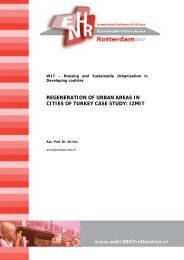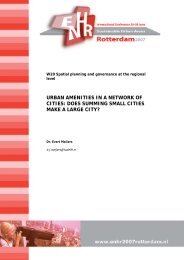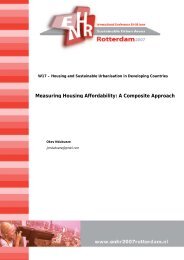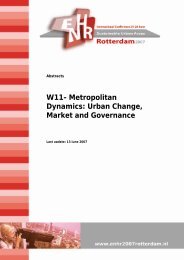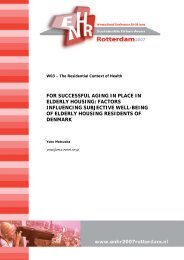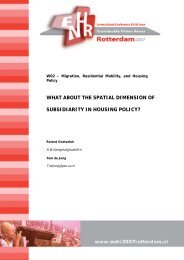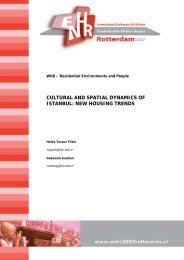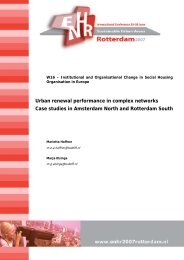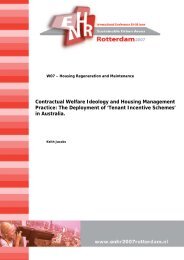The new Dutch Land development Act as a tool for value capturing
The new Dutch Land development Act as a tool for value capturing
The new Dutch Land development Act as a tool for value capturing
Create successful ePaper yourself
Turn your PDF publications into a flip-book with our unique Google optimized e-Paper software.
<strong>The</strong> <strong>new</strong> <strong>Dutch</strong> <strong>Land</strong> <strong>development</strong> <strong>Act</strong> <strong>as</strong> a <strong>tool</strong> <strong>for</strong> <strong>value</strong> <strong>capturing</strong><br />
profitable public transport facilities possible. Originally, creating scarcity of building land w<strong>as</strong><br />
seen <strong>as</strong> an important policy <strong>tool</strong> <strong>for</strong> the financial fe<strong>as</strong>ibility of the <strong>new</strong> urban are<strong>as</strong>. <strong>The</strong> rise of<br />
the prices of building land w<strong>as</strong> necessary <strong>for</strong> the government to be able to develop the rather<br />
expensive <strong>new</strong> urban are<strong>as</strong>. However, this planning policy also made it rather early clear<br />
which sites would be developed <strong>for</strong> urbanisation. Buying agricultural land in the are<strong>as</strong><br />
involved w<strong>as</strong> there<strong>for</strong>e <strong>for</strong> private developers less risky than it had been in the p<strong>as</strong>t. And,<br />
because the policy also involved a limitation of the are<strong>as</strong> to be developed, buying land<br />
became even more important to be able to participate in the <strong>development</strong> at all.<br />
Sometimes, local government itself <strong>as</strong>ked private developers to participate in land<br />
<strong>development</strong>. <strong>The</strong> relatively poor economic situation in the 1980 h<strong>as</strong> made them rather<br />
reserved against buying land on stock; cooperation with private developers w<strong>as</strong> seen <strong>as</strong> a<br />
possibility to reduce risks <strong>for</strong> the government.<br />
<strong>The</strong>se trends were intensified by <strong>development</strong>s on the housing market. <strong>The</strong> general rise of<br />
house prices made land <strong>development</strong> less risky.<br />
Nowadays the situation on the land market in the Netherlands there<strong>for</strong>e differs from the<br />
situation 20 years ago. More and more parties have become interested in participating in land<br />
<strong>development</strong>.<br />
This <strong>new</strong> situation, <strong>as</strong>ks <strong>for</strong> a reorientation on the position of the government in land<br />
<strong>development</strong>. <strong>The</strong> traditional active land <strong>development</strong> often h<strong>as</strong> to be replaced by a more<br />
facilitating land policy. <strong>The</strong> question who profits from the plus <strong>value</strong> h<strong>as</strong> to be answered in a<br />
different context.<br />
From site <strong>development</strong> towards area <strong>development</strong><br />
In 2004 a <strong>new</strong> memorandum on National Spatial Strategy h<strong>as</strong> been approved by Parliament<br />
(Nota Ruimte, 2006). In the <strong>new</strong> spatial policy, <strong>development</strong> on a regional level is stimulated.<br />
An integrated approach on the regional level is regarded <strong>as</strong> important <strong>for</strong> improving spatial<br />
quality (Korthals Altes, 2006).<br />
One of the conclusions of the <strong>for</strong>mer Spatial Strategy w<strong>as</strong> that in some are<strong>as</strong> the <strong>development</strong><br />
of <strong>new</strong> housing are<strong>as</strong> w<strong>as</strong> not enough connected to the <strong>development</strong> of <strong>for</strong> example<br />
recreational projects or (public) infr<strong>as</strong>tructure projects. If the spatial policymaking is<br />
organised on the regional level, the decision about this kind of projects could be better<br />
connected. But not only the decision-making: also housing and other commercial<br />
<strong>development</strong> projects could contribute financially to make other regional projects fe<strong>as</strong>ible. In<br />
such an area oriented <strong>development</strong> strategy, the concept of <strong>value</strong> <strong>capturing</strong> becomes relevant.<br />
Legal system <strong>for</strong> <strong>value</strong> <strong>capturing</strong> in the Netherlands: current practice<br />
Until now, the general system in the Netherlands is that the <strong>value</strong> incre<strong>as</strong>e of land, caused by<br />
a change of the admitted land use in a legally binding planning document (<strong>for</strong> example from<br />
agricultural land to commercial <strong>development</strong>), falls to the landowner. <strong>The</strong> actual legal<br />
possibilities <strong>for</strong> the government <strong>for</strong> <strong>value</strong> <strong>capturing</strong> in the c<strong>as</strong>e a private land owner develops<br />
the land himself, are mainly limited to cost recovery.<br />
For this situation, two legal instruments are relevant: the so-called <strong>Land</strong> <strong>development</strong><br />
Agreement (Exloitatieovereenkomst) and a cost recovery tax (baatbel<strong>as</strong>ting). <strong>The</strong>se<br />
instruments allow the recovering of costs of (some of) the investments done by the local<br />
government. <strong>The</strong> system is comprehensive: the government cannot use other powers <strong>for</strong> <strong>value</strong><br />
<strong>capturing</strong>, besides these two. So <strong>for</strong> example, the government cannot refuse some kind of<br />
permit a developer needs <strong>as</strong> long <strong>as</strong> a payment b<strong>as</strong>ed on the plus <strong>value</strong> h<strong>as</strong> been made.<br />
5<br />
Workshop: Legal Aspects of Housing, <strong>Land</strong> and Planning<br />
Author: Herman de Wolff



